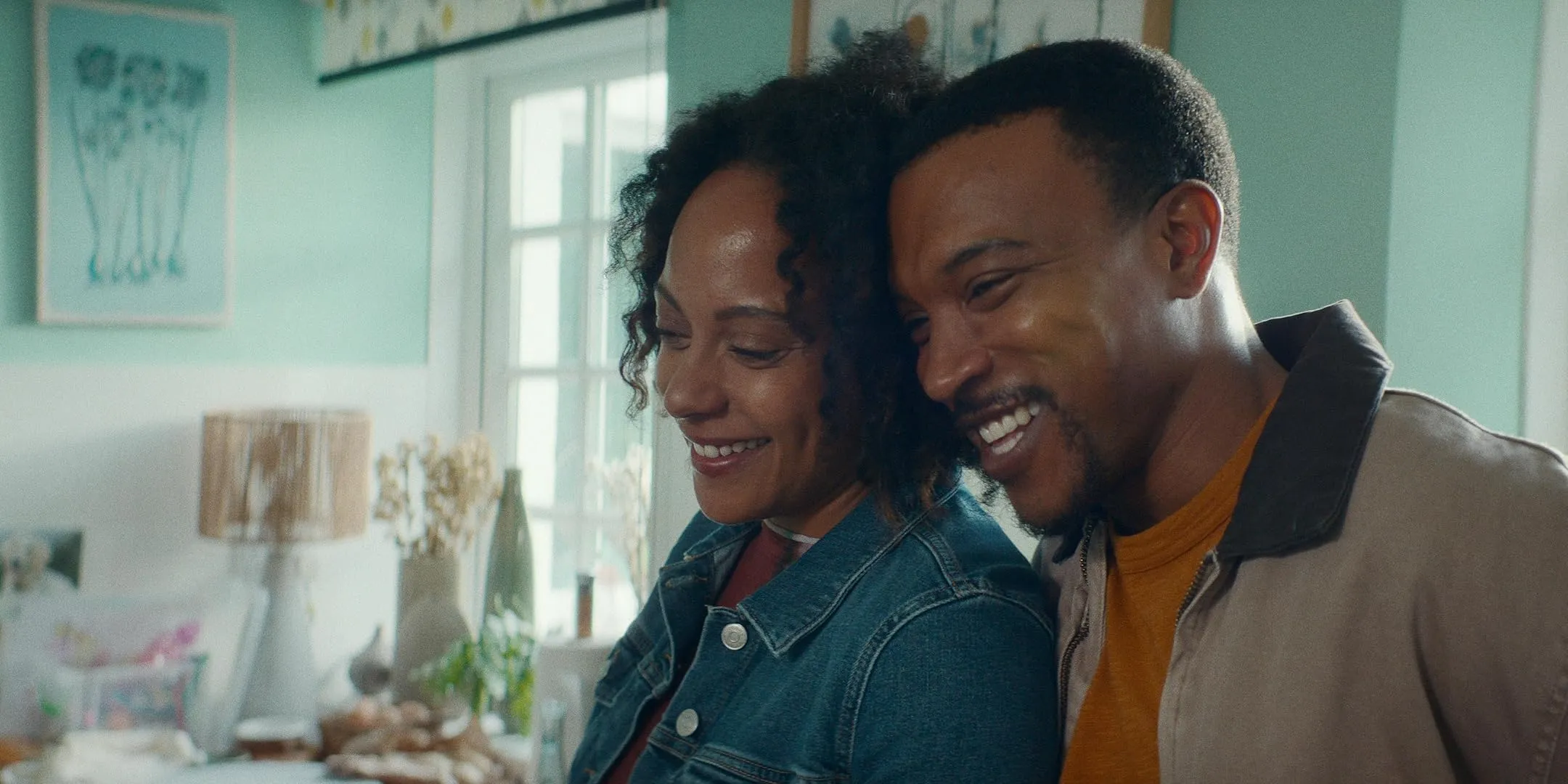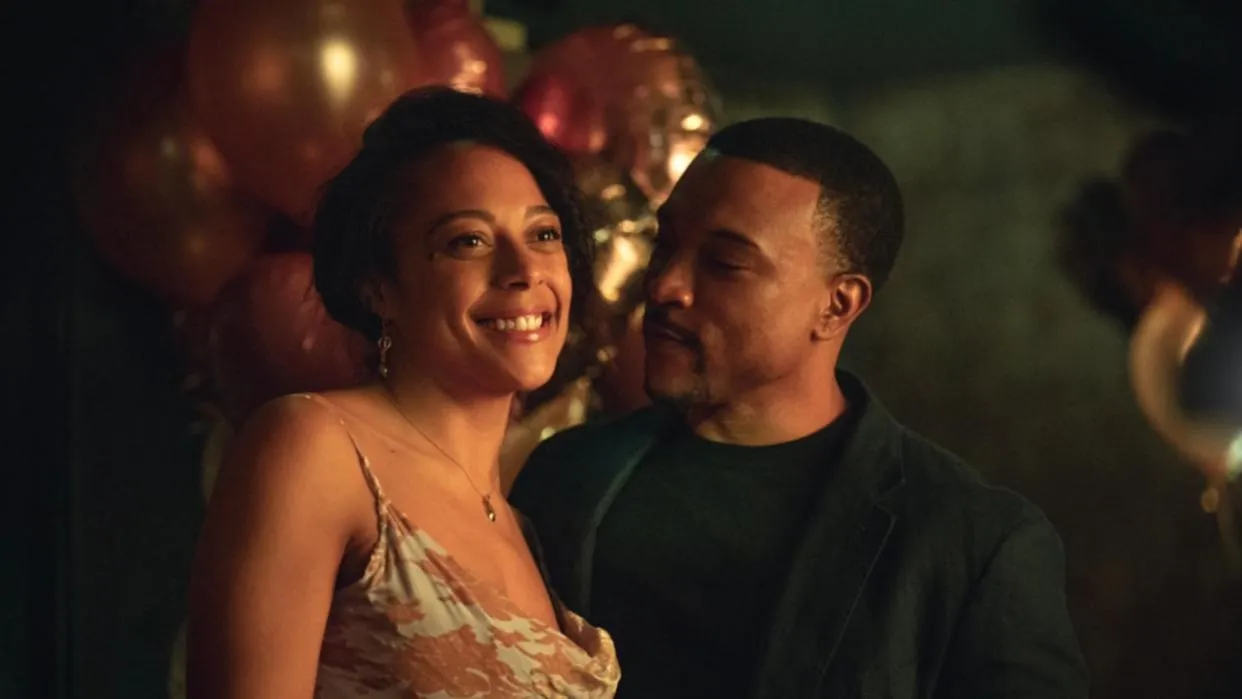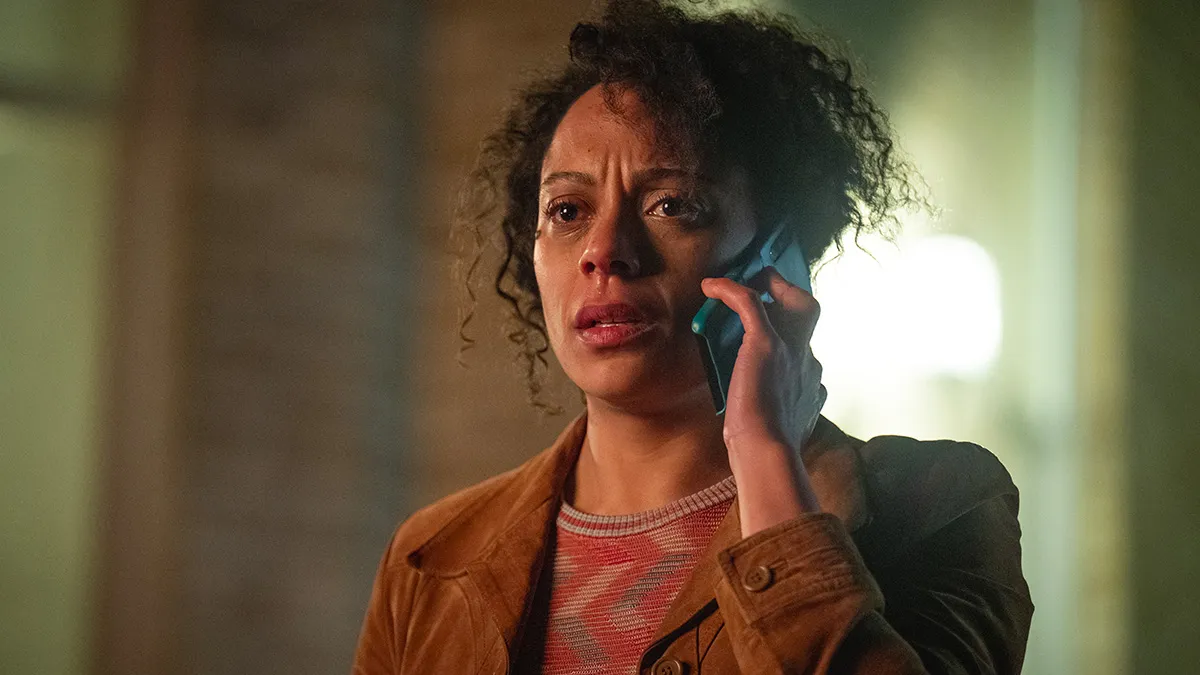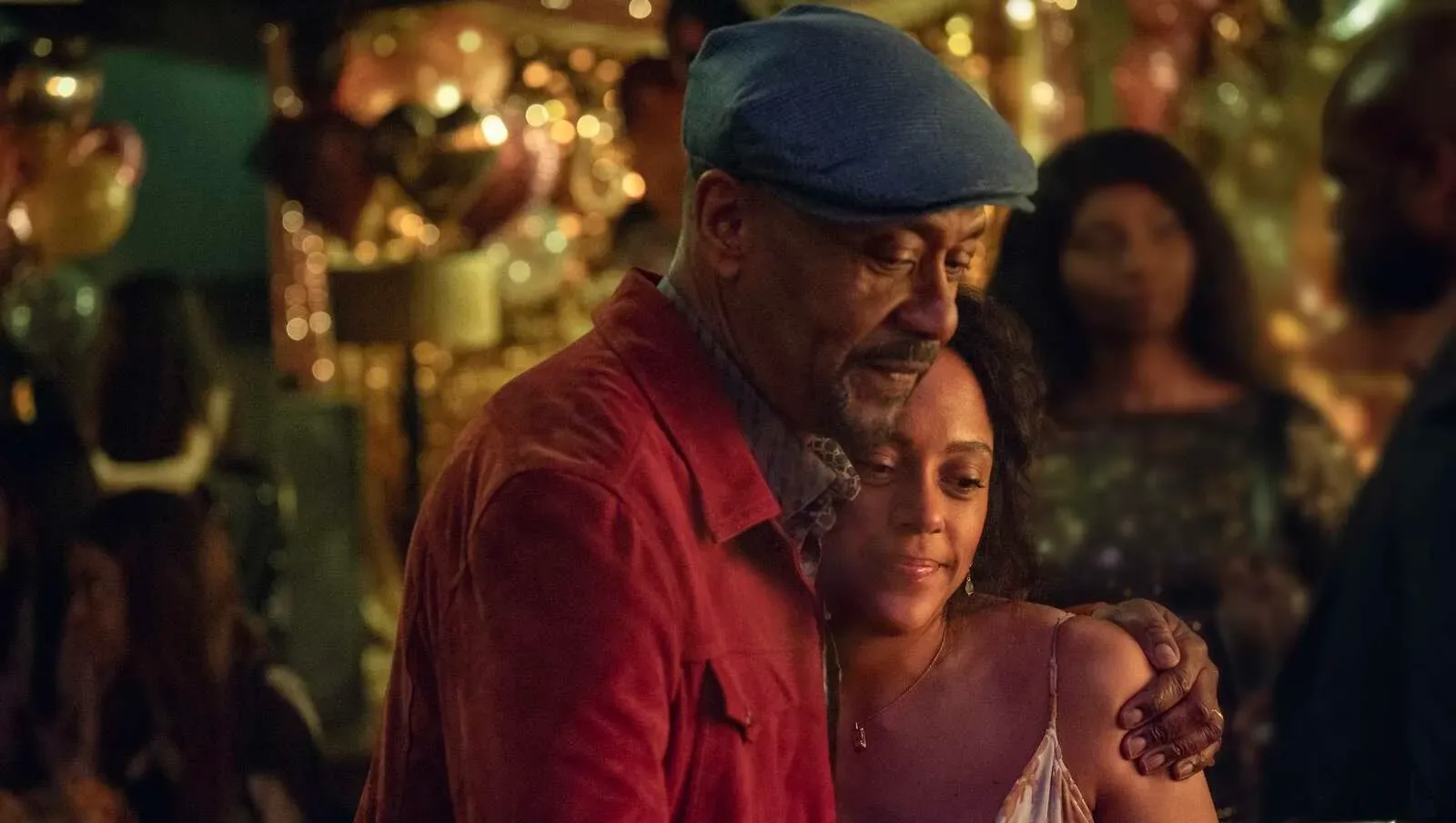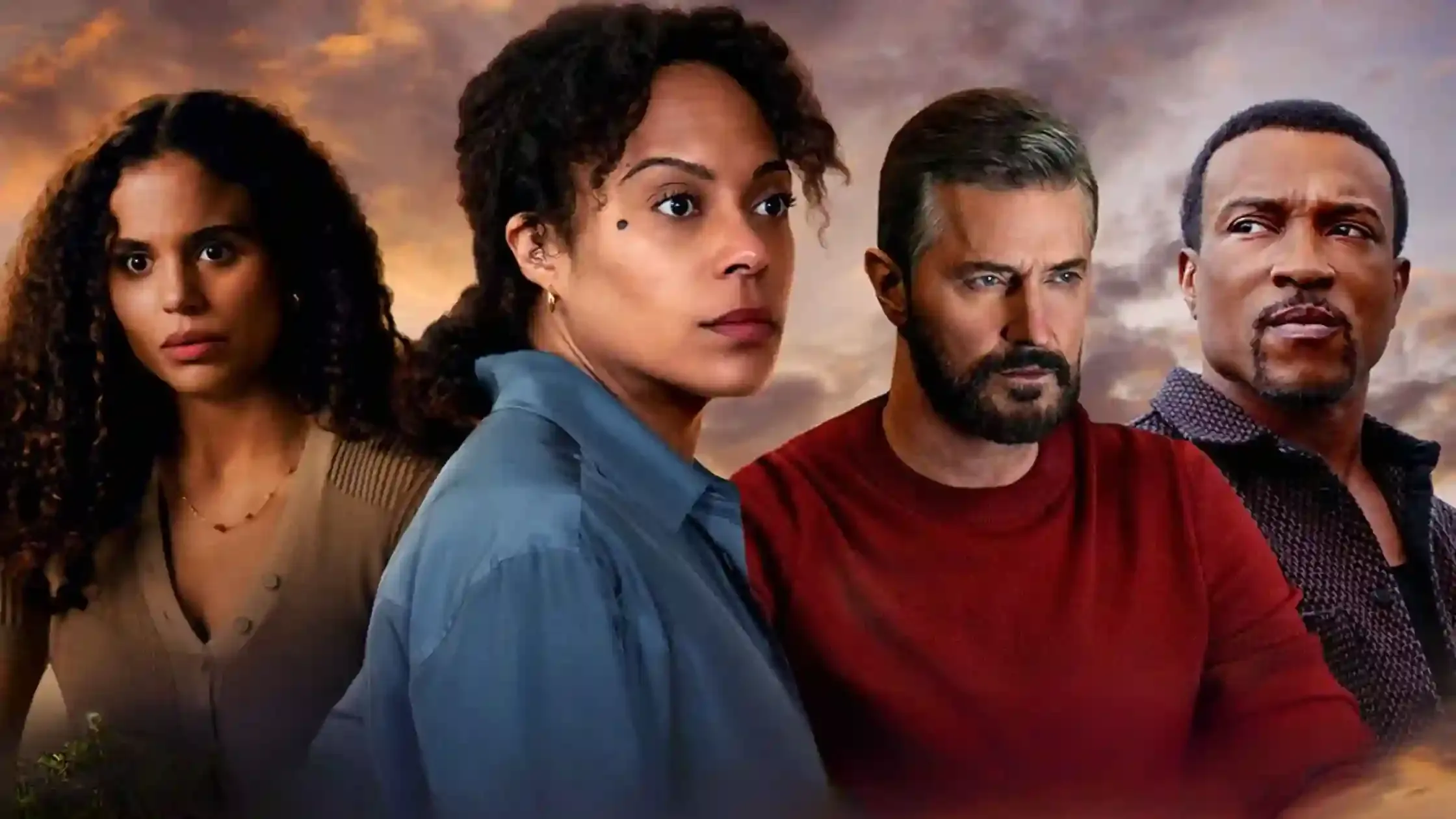Missing You is mostly about Detective Inspector Kat Donovan (Rosalind Eleazar), who is haunted by the murder of her father and the sudden disappearance of her fiancé. Her emotional journey reflects a society afraid to confront its shared grief.
Finding Josh’s (Ashley Walters) profile on a dating app serves as a catalyst, bringing together her pain and her professional job. Can we escape the shadows of our quest? This connection begs the existential question.
The side story about a missing teen’s mother is a moving backdrop and mirrors Kat’s quest for closure. It underscores their fragility in a digital age that frequently destroys personal connections.
Every case Kat looks into shows how society doesn’t pay enough attention to personal trauma. This turns her job duties into a deeper reflection on loss and the human state. The narrative makes fun of cultural amnesia and shows how desperately we look for meaning in a world full of chaos.
The Anatomy of Loss: Navigating Kat Donovan’s Inner Landscape
Rosario Eleazar plays Kat Donovan, who is more than just a detective. She is a live example of unresolved trauma and existential dread. Her character arc is a moving exploration of how her past experiences, especially her father’s loss, and her fiancé’s disappearance, have shaped her current actions.
Kat’s quest for the truth, which often serves as a coping strategy for her emotional scars (think of it as detective therapy), defines her as a person. But this constant need to know raises the question: does searching for answers bring comfort, or does it only make the pit deeper?
Her work life is tangled up with her grief, which shows a basic truth about being human: we often bring our pasts into the present, which can be bad for us. One could argue that these glimpses of grief occasionally feel repetitive, as if the narrative is caught in a time loop of grief, despite the series’ clever use of flashbacks to reveal her vulnerabilities. People may never be able to escape the weight of their past, which is a philosophical question.
Josh (Ashley Walters), Aqua (Mary Malone), and Stacey (Jessica Plummer), on the other hand, are the minor characters who act as Kat’s mirrors and opponents. Josh, the enigmatic ex-fiancé, personifies the complexities of abandonment. His absence is like a ghost that follows Kat around and affects every choice she makes. But his character is flat and is often just a story device instead of a fully realized person.
However, Aqua and Stacey offer a more complex depiction of friendship. They push Kat to reflect and grow by challenging her choices. This situation shows the idea of support groups in dealing with trauma and that healing often needs community. However, one could argue that while these characters are interesting, they occasionally feel underdeveloped—just shadows in Kat’s narrative rather than fully developed people.
Kat’s interplay with her supporting company ultimately enhances the exploration of loss and recovery. Even as Missing You struggles to fully realize each character’s promise, their presence in her journey helps to illuminate the complex web of relationships that makes us who we are.
The Art of Portrayal: A Study in Performance
Rosalind Eleazar’s portrayal of Kat Donovan is remarkably complex. She captures a blend of vulnerability and resolve that hits home with viewers. She brings a raw authenticity to the part as she navigates the emotional landscape of a woman haunted by loss. Eleazar’s performance is like a finely tuned instrument; he can show how Kat’s mood changes subtly, from strong determination to heartbreaking sadness, often in the same scene. Some might even say she gets a prize for making trauma look cool.
Eleazar’s depth often makes the performances of the other key actors, like Ashley Walters and Josh, feel less important. Josh isn’t a character; he’s more of a hanging question mark. It’s not clear what drives him. When a lead shines so brightly, it can illuminate the flaws of others, leaving them in the shadows. This difference makes an interesting point about character development.
Lenny Henry gives a moving performance as Kat’s father, who stays with you even though his character doesn’t have much screen time. His presence serves as a haunting reminder of Kat’s unresolved grief, which successfully raises the emotional stakes of the series. Characters like Stacey (Jessica Plummer) and Aqua (Mary Malone) offer a new vibrancy. However, they sometimes fall into stereotypes because they lack the nuanced depth that would make them fully realized counterparts in Kat’s journey.
The ensemble cast improves the narrative, but it is not without faults. The over-the-top acting sometimes takes away from the general mood, especially when it is necessary to be subtle. Intense performances are occasionally interrupted by moments that feel more at home in a soap show than a tightly woven mystery due to this clash of styles, which creates an interesting dynamic. The performances in this series add to the story’s emotional core, but they also show how difficult it is to strike a balance between being thrilling and deeply human.
The Rhythm of Revelation: Pacing and Structure in Missing You
The pacing of Missing You’s five episodes reflects a conscious effort to balance tension and narrative depth, akin to a masterfully composed symphony (though occasionally interrupted by a missed note). The series doesn’t waste any time introducing viewers to Kat Donovan’s world by jumping right into the emotional turmoil that makes her character who she is.
Although some might argue that it occasionally drags in moments that could benefit from a snappier tempo, each episode unfolds with a steady, almost methodical rhythm that allows for both character development and plot growth.
The structure is meant to keep viewers interested by carefully placing cliffhangers to encourage binge-watching. One could argue, though, that sometimes nuance is sacrificed in the constant effort to keep engagement. As Kat moves quickly through her investigations, the series risks turning into a mad dash instead of a thoughtful exploration of grief and resolution.
Missing You successfully navigates the difficult task of juggling various plotlines. The intertwining narratives of Kat’s personal and professional life add to the watching experience but can also make it difficult to concentrate. The series tries to balance the mystery of Josh’s disappearance with the case of a missing mother, but sometimes it feels more important than the other.
While the initial intrigue is compelling, the series risks losing viewers if the emotional depth falls short of the action. Missing You tries to find the right mix between mystery and character exploration, but sometimes the narrative gets too long, and viewers feel lost in a sea of unanswered questions. Such is the paradox of contemporary storytelling: a quest for engagement that can occasionally drown out the themes it tries to illuminate.
Threads of Abandonment: Weaving Themes in Missing You
Missing You skillfully navigates the tangled themes of loss and trauma, crafting a narrative that deeply connects with modern worries about loss and connection. The journey of Kat Donovan is a moving exploration of how the ghosts of her past—specifically, the sudden disappearance of her fiancé and the murder of her father—affect her present.
The way she deals with trauma serves as a catalyst for her character growth, not just as a background. Each flashback, even if it’s the same one repeatedly, underscores the emotional stakes at play and forces viewers to confront their losses.
The series does a great job of showing that abandonment can happen in ways that are not just personal. Kat represents the fight to reclaim agency in a world that often feels indifferent and is increasingly characterized by ghosting—both in action and digital relationships. As a result of this theme, audiences may reflect on their own unresolved tragedies, creating a sense of shared understanding.
Kat’s friends Aqua and Stacey and her family are important parts of this exploration because they are there for her. These relationships are important lifelines that give her stability and conflict; they are not just extras in her narrative. The series shows how important these ties are and how friendships can sometimes be comforting and heavy.
Kat is dealing with her own personal demons, and Aqua and Stacey are like mirrors, reflecting on her issues and making her think twice about her choices. Their growth throughout the series highlights the importance of human connection in the face of hardship—a stark warning that healing frequently requires a community (even if that community occasionally drives you crazy).
In the end, Missing You says that even though trauma can make us feel alone, the relationships we build can help illuminate the way to understanding and healing. In addition to enhancing the narrative, this interplay between abandonment and support reflects larger societal conversations about mental health and the complexity of human relationships in a world that is becoming increasingly fragmented.
Navigating Engagement: The Viewer Experience in Missing You
You makes excellent use of the current binge-watching trend, crafting an experience that is both compelling and, at times, hard to stop watching. With the skill of a master magician pulling rabbits out of hats (or, in this case, the plot turns out of thin air), the series uses cliffhangers and narrative hooks.
Every episode is carefully planned to keep viewers on the edge of their seats, eager to see what happens in the next one. After all, who doesn’t love a good whodunit that challenges the mind while keeping the heart racing?
This constant pacing, however, can have negative consequences. One could argue that the series occasionally skips over depth in favor of speed, despite the obvious tension. While the fast-paced revelations may leave viewers feeling pumped, they risk only touching on the emotional depth of Kat’s trip. In this case, there’s a lot of “more, more, ” a binge-watching buffet that can make us feel a little stuffed.
Compared to other movies based on Harlan Coben’s books, Missing You stands out because it focuses on telling stories through characters instead of just plot mechanics. It has all the usual elements of a crime drama: mysterious disappearances, characters with questionable morals, and a good amount of intrigue. However, it also adds a layer of psychological exploration that makes it better than most crime dramas.
Viewers who are just looking for a way to escape reality may find themselves wanting a simpler narrative. The series does, however, provide a satisfying experience for those who enjoy a blend of entertainment and reflection.
While keeping you guessing about the next turn in the story, it encourages you to reflect on the nature of relationships and the impact of trauma. The complexities of modern life, where every revelation can feel thrilling and confusing, are captured in this balancing act, making for a unique watching experience.
Reflections on the Shadows: Final Thoughts on Missing You
Missing You develops into a compelling exploration of trauma, abandonment, and the pursuit of connection in a broken world. Rosalind Eleazar’s performance as Kat Donovan holds the narrative together, weaving together personal and professional issues relatable to viewers navigating their emotional landscapes.
The series masterfully employs pacing and cliffhangers to keep viewers interested, making it almost impossible to stop watching.
Despite this, the series has some flaws, especially regarding character development and keeping all the plots balanced. The supporting cast adds to the narrative’s depth, but they occasionally feel underdeveloped, leaving Kat to carry the story’s emotional weight.
In the end, Missing You offers viewers both thrills and deep reflection, encouraging them to reflect on the complexities of human relationships. It mirrors societal problems with trauma and connection, making it more than just a mystery but also a commentary on the human situation.
The Review
Missing You
Rosalind Eleazar's compelling performance as Kat Donovan propels Missing You's skillful intertwining of mystery and profound emotional themes. While the series shines at pacing and character exploration, it occasionally falls short on supporting characters and character development. However, it offers a thought-provoking look at trauma and connection in modern society. Missing You is an exciting movie that will make you reflect long after the end credits roll.
PROS
- Strong lead performance by Rosalind Eleazar.
- Engaging pacing and suspenseful cliffhangers.
- Thoughtful exploration of trauma and human connection.
- Compelling character arcs, particularly for the protagonist.
CONS
- Underdeveloped supporting characters.
- Occasional pacing issues that hinder emotional depth.
- Some plotlines feel muddled or rushed.
- Relies heavily on familiar crime drama tropes.









































